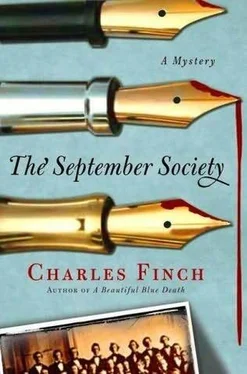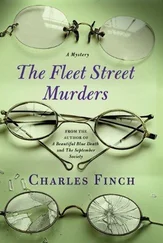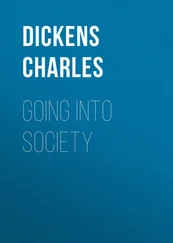Charles Finch - The September Society
Здесь есть возможность читать онлайн «Charles Finch - The September Society» весь текст электронной книги совершенно бесплатно (целиком полную версию без сокращений). В некоторых случаях можно слушать аудио, скачать через торрент в формате fb2 и присутствует краткое содержание. Жанр: Исторический детектив, на английском языке. Описание произведения, (предисловие) а так же отзывы посетителей доступны на портале библиотеки ЛибКат.
- Название:The September Society
- Автор:
- Жанр:
- Год:неизвестен
- ISBN:нет данных
- Рейтинг книги:4 / 5. Голосов: 1
-
Избранное:Добавить в избранное
- Отзывы:
-
Ваша оценка:
- 80
- 1
- 2
- 3
- 4
- 5
The September Society: краткое содержание, описание и аннотация
Предлагаем к чтению аннотацию, описание, краткое содержание или предисловие (зависит от того, что написал сам автор книги «The September Society»). Если вы не нашли необходимую информацию о книге — напишите в комментариях, мы постараемся отыскать её.
The September Society — читать онлайн бесплатно полную книгу (весь текст) целиком
Ниже представлен текст книги, разбитый по страницам. Система сохранения места последней прочитанной страницы, позволяет с удобством читать онлайн бесплатно книгу «The September Society», без необходимости каждый раз заново искать на чём Вы остановились. Поставьте закладку, и сможете в любой момент перейти на страницу, на которой закончили чтение.
Интервал:
Закладка:
“There you have it, Inspector,” said Lenox.
“What do you mean?”
“Even if the killer had some means of transport, the scene of the murder can’t have been far off at all. And this park is only accessible by foot, which cuts down the distance even further.”
“Ah,” said Goodson, writing on his pad. “So the fight could only have taken place within a fifteen-minute walk of this spot.”
“Call it a four-minute walk, actually-perhaps a six-minute perimeter south of here, figuring that one walks much less quickly when carrying so much weight.”
“All right-I’ll tell the lads.”
“Just a moment,” Lenox said. “What about objects near the body?”
“At the station. Here, Ramsey, take these gentleman to the station when they’re ready to go and show them the box of things we found. All right, Mr. Lenox, Mr. McConnell.” With a nod Goodson walked off to give the men by the river to the south their instructions, stopping on the way to bark at the crowd that had gathered until they dispersed.
Ramsey came over. “On your signal, then,” he said.
Lenox nodded. “Give it ten minutes, if that’s all right?”
“Just as you say.”
When they were alone, McConnell said, “What do you reckon?”
“Well, above all I’m grateful to you for finding a way for us to see this place. My other two thoughts are that we’re dealing with someone remarkably clever and that if there’s no sign of Dabney anytime soon it looks a bit black against him. Now what about the body?”
“We’ve covered some of the details these past few minutes. There’s not much else to tell. He was garroted, but he put up a damn good fight. I’d say the murderer will have some wounds to show for it. It was a standard stud chain garrote.”
“What’s that?”
“A long leather loop with a metal chain on the end.”
“How easy do you reckon it is to acquire one of those?
I most often see scarves or fishing line as garrotes. Piano wire once.”
“Quite easy. It was a stud chain, the kind used to whip horses. You can find one in any stable.”
Lenox thought for a moment, then said, “Go on.”
“There were two other singular circumstances that Morris and I discovered. One, the body was bloody and badly mauled around the face and torso.”
“Unrecognizably so?”
“No, perhaps not, but badly. It’s strange, given how short a time the body was exposed to the elements.”
“Animal wounds?”
“That’s hard to say.”
“What was the other singular circumstance?”
“How closely shorn his hair was.”
“Disguise, I would have thought.”
“On his head, to be sure-but the hair was shorn from all over his body, you know, not just his head.”
“That’s passing strange.”
“We thought so, too.”
The doctor and the detective discussed George Payson’s corpse for another moment and then made their way to look at the objects found around the body with Constable Ramsey.
At the station the constable brought out a small cardboard box, filled with a random and, truth be told, somewhat unsatisfactory collection of odds and ends, most of which had probably been simply dropped in the park and never cleared away. There was a white feather, a receipt for a new hat to be picked up in a day’s time, several candy wrappers, a child’s mitten, a muddy and blank sheet of small paper, and a pin that was, Lenox saw with a thrill undercut by doubtfulness, the color red.
“Disappointing lot,” he said to Ramsey.
“It is, yes. ’Spector Goodson was ’opin to find a bit more. If that’s all, sir?”
“Yes, yes, thanks.”
As they left the police station and walked up Cornmarket Street, McConnell pulled Lenox into a doorway.
“One more thing, old man,” he said. “I kept it aside for you.”
“What is it?”
“We found Payson’s university identification in his pockets, cigarettes, some money, a pair of eyeglasses-and this.” He handed Lenox a scrap of paper. “I thought it might be important.”
“You were right,” Lenox said in a low, startled voice. There was a long pause during which he cycled rapidly through the list of clues he had made.
“What do you make of it?”
“For one thing it proves, I think, that we have a third companion in the search for the murderer: Payson himself is helping us.”
He looked at the scrap of paper again: a flimsy card, blank except for the words THE SEPTEMBER SOCIETY, which were written in red ink.
CHAPTER EIGHTEEN
L enox sat drinking a cup of coffee in the back room at the Turf, wondering whether Goodson had made any progress. Likely they had at least found something that would help establish that Payson had been staying in the fields to the south of Oxford-but, he thought with a sigh, where would that get them? Unless Dabney had left behind a witnessed and notarized description of what had happened, there would probably be little to gather from the site where they had stayed.
Then, just as he found himself sinking into pessimism again, Lenox saw something delightful hovering by the bar, looking respectfully toward him. It was a welcome sight: Graham.
“Graham! Good Lord!”
“I hope I haven’t startled you, sir?”
“A bit, yes. Rather like seeing Banquo’s ghost in gray spats. Why are you here, anyway? Not that it’s not jolly to have you, of course.”
“I took the liberty, sir, of catching the morning train. I thought I might be of some assistance.”
(Graham often helped Lenox with his cases, possessing as he did an uncanny ability to discover information that seemed lost or buried, and understanding intuitively what mattered and did not. It was another example of their unusual friendship, so different than any other in London.)
“Dead right,” said Lenox warmly. “I’ve never needed it more. What of home?”
“Sir?”
“Everything calm there, I mean?”
“Ah-yes, sir. I’ve brought your post as well.”
“Thank you very much, Graham. I really am glad to have you here.”
“There’s not much in it, sir, though you’ve had another visit from John Best.”
“Whose card I had the other morning?”
“Yes, sir.”
“Who the devil is he?”
“I cannot say, sir.”
“Odd.”
“Yes, sir. I trust the case is progressing?”
“It’s hard to tell. Hopefully.”
“Yes, sir.”
Lenox thought for a moment. “I say, Graham, why don’t you check us into the Randolph over on Magdalen Street?”
“Sir?”
“I’ve been staying here, but it would be appalling of me to impose my nostalgia on you. I doubt you’d see the charm in the place if you hadn’t been dropped here before every term.”
“I shall attend to it straight away, sir.”
“Mrs. Tate?” Lenox called out, and the Turf’s proprietor popped her head around the corner. “Mrs. Tate, do you mind awfully if I leave for the Randolph?”
“Is everything all right, Mr. Lenox?” she said.
“Oh-perfect, of course. It’s only that my valet here has come up, too, and I think it would rather stretch your hospitality to find a bed for him.”
She gave an understanding nod. “It won’t be too long before we see you again, though, will it?”
“Oh, definitely not,” said Lenox. “It had been too long since I last visited Oxford.”
“Certainly had, sir. Ah-a customer!”
When she was gone, Lenox said, “Can I talk something over with you, Graham?”
“Of course, sir.”
“Have a seat here. Anything to eat?”
“No, thank you, sir.”
“Good enough. The problem is this fellow Hatch, the professor at Lincoln. He’s got his back up about me, I’m sure, because I went around and asked him about the two lads. I think he may be at the bottom of all this somehow, whether he’s the primary mover or not.”
Читать дальшеИнтервал:
Закладка:
Похожие книги на «The September Society»
Представляем Вашему вниманию похожие книги на «The September Society» списком для выбора. Мы отобрали схожую по названию и смыслу литературу в надежде предоставить читателям больше вариантов отыскать новые, интересные, ещё непрочитанные произведения.
Обсуждение, отзывы о книге «The September Society» и просто собственные мнения читателей. Оставьте ваши комментарии, напишите, что Вы думаете о произведении, его смысле или главных героях. Укажите что конкретно понравилось, а что нет, и почему Вы так считаете.












